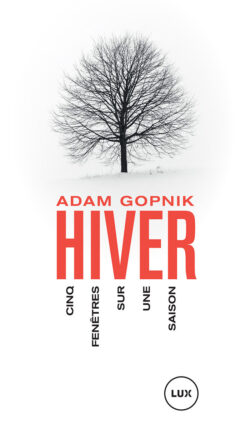Sous-total: $
Winter, by Adam Gopnik
During the expansive half century that has passed since the late British economist Barbara Ward delivered the first Massey Lectures, on the subject of rich and poor nations, the annual five-part series has become an institutionalized treat for those I will presume to call « thinking » Canadians.
Broadcast on CBC Radio on successive nights in early November and published simultaneously by House of Anansi Press, the lectures are a sort of all-week sucker, a Stanley Cup final for the mind, that, in their customary subversions, comprise exactly the sort of programming that has made the Conservative corral in Ottawa itchy to cut funding to CBC Radio.
While this year’s topic, winter, is a natural for Canadians, the season itself (as distinct from its intellectualization as a topic) is anything but. Indeed, for many of us, winter is less a phase of nature, less a season, than a sort of alien despondency; a detestable condemnation to snow-shovelling and stuck cars and cynical Christmases, to too-short days and a too-long hockey season (a season made longer for some of us by our allegiance to an entirely other level of alien despondency, the Toronto Maple Leafs).
This year, happily, just as we begin girding for the noirceur, along comes Adam Gopnik, our Massey guide, under a crown of lights, ashiver with insights and good will, ushering us up excitedly to what he has dubbed « five windows on the season » – which is to say, five lectures, all dazzlers, that, when the time comes in November, I look forward to experiencing again, on the radio, in the magician’s own voice. And again when I need them, if only to dispel the effects of January and February.
Gopnik, a long-time New Yorker writer who grew up in one of the wintriest cities in the world, Montreal, begins his tour of the season with a tantalizing lecture on Romantic Winter. He evokes first a memory of himself as a boy gazing from the window of the family home, appreciatively safe inside, as a November snowstorm swirls into the street and garden.
The gist of what follows is that it was not until the mid-1700s, with the advent of coal mines and of coal as heating fuel, that winter was sufficiently tamed to be rendered romantically into painting and literature and music – and more broadly into the Western parlour and mind. And of course into the thoughts of a boy at the window.
This new attitude to the season was simultaneously an escape from « the too rationalized, the too Cartesian, the too reasonable systems of the French Enlightenment. »
In a subsequent lecture, Gopnik rediscovers this sense of flight in the pleasure and elegance of skating and, later yet, in Joni Mitchell’s elegiac lament, « Wish I had a river I could skate away on. »
In order to make a point, I must skip momentarily to Gopnik’s concluding lecture, Remembering Winter. This most personal and poignant of his « five windows » is a return to the boy and the snowstorm – winter as memory, as time, as loss. It is also, in its way, as logical a choice of subject matter and perspective as was the content of lecture one.
By contrast, I hasten to add, everything that comes between is a kind of nuthouse opera, a Saturnalia, to use one of Gopnik’s words, a capricious upending of our expectations.
And more power to it. And to him for his insolence.
Lecture two, Radical Winter, for example, is an outright hallucination on the polar expeditions of the 19th century (a boyhood fascination of the author’s). Lecture three, the socio-whimsical Recuperative Winter, is in effect an atheist’s love song, an anthropological rhapsody, to (wait for it) Gopnik’s lifetime enthrallment with the history, practice and meaning of Christmas! He loves Christmas carols; he loves the lights; loves Dickens and Scrooge and Cratchit. He loves snow!
Lecture four, Recreational Winter, another rocket, is presaged by Gopnik’s acknowledgment that he also loves hockey and the Montreal Canadiens, and that his thematic notes for the lecture read in full, « Chance to talk at length about ice hockey. » Which he does with passion and personality.
Mercifully, Gopnik is also a student of skating in its own right, which he explores as both an outgrowth and embodiment of romantic winter, not to mention of our old pal, sex. By the mid-1800s, he points out, « the imagery of skating as it became ‘socialized’ and took to cities, was becoming openly erotic. » Given the repressive sexual attitudes of Victorian New York, it is not surprising that on Saturday afternoons during the 1860s, as many as 30,000 people would gather at the Great Rink in Central Park, either to skate or watch.
Despite his inspirations, Gopnik offers no jaw-dropping conclusions or theories about winter and our relationship to it. Apart from the aforementioned brashness, what he does bring to the page is a stream of endlessly entertaining insights and ideas – a treasury of people and places and art.
One of his concluding points is that, in effect, we have been robbed of winter (both its beauty and its refining miseries) by central heating and underground cities and warm cars – and now of course global warming. With the exception of this last and most devastating influence, it is a theft to which I happily submit.
As for the deeper insinuations of winter – a coefficient of loss, of memory, of the non-stop erasures of time – I’m with Joni Mitchell, wishing I had a river I could skate away on.
Charles Wilkins, The Globe and Mail, 7 octobre 2011
Lisez l’original ici.
 Mon compte
Mon compte






